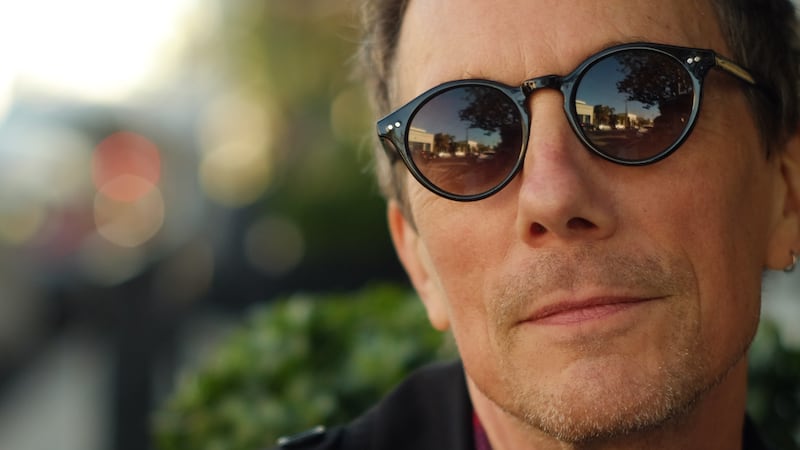If you recognize the name Steve Barton, it's probably for one specific reason—the 1982 semi-hit "Everywhere That I'm Not." Recorded by his band, Translator, the song is a shuffling, wry and haunted love song in which the object of the narrator's attention is forever out of reach.
"'Cause you're in New York/but I'm not/You're in Tokyo/but I'm not," Barton sings. "You're in Nova Scotia/but I'm not/Yeah, you're everywhere that I'm not."
Thirty-six years later, Barton is in Portland. The still boyish 63-year-old Los Angeles native is a recent addition to the list of the city's alt-rock transplants, as well as a late addition to the city's history of '80s MTV faves like Nu Shooz and Quarterflash. Barton has called Cully home since 2016, not long after Omnivore Recordings put out the odds-and-sods Translator release Sometimes People Forget. He took the train up from California to promote it with a solo in-store at Music Millennium.
"I just fell in love with the place," he says. "It's so beautiful, and there was a vibe here that kind of speaks to me. Our mantra is, 'More trees, less people,' which is what we got."
Earlier this month, Barton released his seventh solo record, and first one as a Portland artist. Or rather, his seventh, eighth and ninth solo records: Tall Tales and Alibis is a triple record that is also three distinct albums, two of which were recorded solo after Barton moved to Portland, the other with an LA band of mostly longtime collaborators, including Marvin Etzioni of Lone Justice, Willie Aron of the Balancing Act, and Derrick Anderson of the Bangles, as well as Translator drummer Dave Scheff and Pete Thomas of Elvis Costello and the Attractions.
"The first one's sort of pop songs, stripped-down rockin' stuff," Barton says. "The middle record is a quiet, dark record. And then there's the band album. It's definitely three albums, but they kind of build something."
Intentionally or not, many of the song titles scream "Portland!": "Northwest Girl," "From the Rain," "Wake Up in Roses." "It's been incredible for me creatively," Barton says of the relocation. In fact, between the time he finished Tall Tales and Alibis and its March release date, Barton wrote enough songs to cut a whole other record with Scheff, Dark Blue Energy, which came out last September. And Translator—which first broke up in 1986 and reunited two decades later—also put out an album in the spring of 2017.
"Since he's moved to Portland, he's sending me sometimes literally five new songs a week," says Scheff. "[He'll ask,] 'Hey, is this good?,' and they're all great."
A songwriting prodigy, Barton formed his first band, the Present Tense, when he was just 11, and had a publishing contract with ABC-Dunhill at 14. Before Translator, he and Scheff also toured Japan as part of a cut-rate, Beatlemania-style tribute show. Barton played John, while Scheff, of course, was Ringo.
Translator, which also includes co-frontman Robert Darlington and bassist Larry Dekker, were, at their core, a Beatles-inspired pop outfit, but also dark, spiky and danceable. Over their four albums, you can hear echoes of everyone from Gang of Four to Neil Young and Crazy Horse, while R.E.M. and the Dream Syndicate were both peers and kindred spirits. Their songs were also frequently political, with Reagan-era topics like nuclear bombs and guns ("Stop This Missile Building," "Another American Night") that unfortunately do not seem dated.
"They were happening when New Wave was happening, but they weren't New Wave," says Music Millennium owner Terry Currier, a fan both then and now. "They weren't straight-ahead rock. They kind of just sat out there on their own. Really well-written songs, but a little off-kilter sometimes, too."
That's still the case for Barton on Tall Tales and Alibis, which is as eclectic as it is expansive, the work of a riff-happy, love-song-loving kind of guy who always adds another layer beyond the catchy and familiar, be it a burst of lo-fi noise, an unexpected genre twist or well-chosen profanity.
In addition to default inspirations like the Beatles, Costello and Bob Dylan, Barton says he was influenced by Robyn Hitchcock and Nick Cave. Perhaps more strangely, the second disc was particularly inspired by Arctic Monkeys frontman Alex Turner's soundtrack to the movie Submarine. That side includes a version of the Sinatra standard "In the Wee Small Hours of the Morning," as well as a slowed-down reworking of Translator's "UnAlone," which grew out of the way he played it live at solo shows. It's likely to be in the set at Music Millennium on Saturday. As for "Everywhere That I'm Not," well, that's guaranteed.
"I do it at all my shows," says Barton. "I never tire of singing it, and the lyrics take on new meaning as the years go by, with sort of the existential bent of the song. Like, the first time I sang it after my dad died, it meant something else. And it makes people really happy when you play it, so what's wrong with that?" JASON COHEN.
SEE IT: Steve Barton and Dave Scheff play Music Millennium, 3158 E Burnside St., on Saturday, March 24. 5 pm. Free. All ages.
